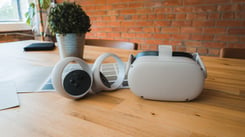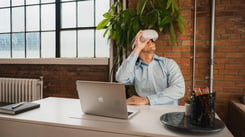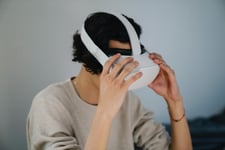It’s hard to ignore the VR boom that has happened in the past few years. From the tethered experience of the Oculus Rift to this year’s launch of the travel-friendly Oculus Go, VR tech companies have challenged our finite idea of what technology can do for us. Falling into the same category as Samsung and Sony, VR tech powerhouse Oculus has established their presence in the tech industry.
.jpg?width=665&name=vr-3411378_1920-1024x636%20(1).jpg)
Watch out for VR in 2019
VR is Changing How We Eat
It may sound like a stretch when stating VR is changing how we eat, however, think about what meals you enjoy most. Is it visually enticing? Does it taste better or feel more comforting when you’re back at your family’s house? A study was conducted in Cornell where participants were given the same blue cheese but tasted in three virtual settings, including in the lab, a park bench, and a dairy farm. Participants perceived the cheese was more pungent in the dairy farm setting. This finding supports how consumers could react differently to the same product presented in a different environment. Cornell’s results significantly help companies in regards to time and resources. Now, food companies don’t need to build different sets for taste testing as the VR experience is just as real as a real-world setting. By doing so, they can allocate their resources into other areas.

Aside from VR influencing the way we eat, the technology has been adopted into restaurants overall workflow. With more businesses seeing the value in VR, many have chosen to train their employees in virtual reality. By simulating a busy day, or a difficult customer, VR training provides the practice without real-life mistakes. Along with training, many businesses have made AR/VR the headliner of their dining experience. With adding a touch of entertainment, chefs like John Cox have started to curate a menu that uses VR to enhance the dining experience.
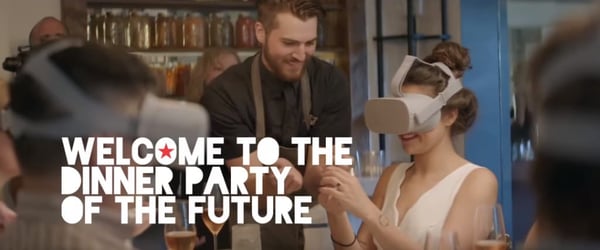
VR and Medicine
The healthcare industry has welcomed VR into much of their workflow. From designing hospitals to new options for therapy, medicine and VR have become very well acquainted. Since VR changes what we see visually, and creates immersive, emotional attachments, the environment we experience can influence whether we perceive a situation as positive or negative.
Administering injections to children is one area where VR has helped physicians. The anticipation and experience of pain is something no one looks forward to, let alone children. Hermes Pardini Laboratories, Ogilvy Brazil and Lobo have teamed up to create a game in VR to help children conquer their fears of shots. VR Vaccine has been successful at warping a stinging needle into a more enjoyable experience. When the child puts on the headset, they are met with a task of taking a “Fire Fruit” through a barrier. What seems to be a jewel being inserted into the arm (the Fire Fruit) is actually the needle administering the vaccine. As one doctor puts it, it was the first time in her 15 year career where “a moment of pain [was] transformed into a moment of entertainment”.
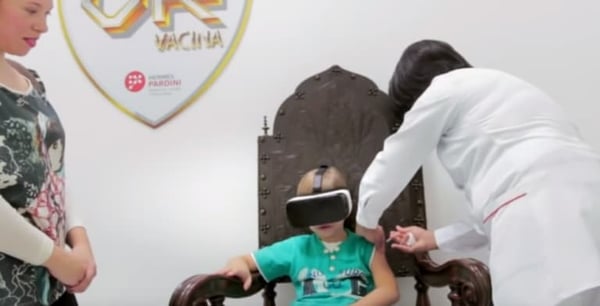
As we have seen, VR helps a physician’s patients, and this technology has also been very helpful in training physicians. Through using 3D models, surgeons are able to visualize their operations better than before. With the added 360-degree graphics, it helps both the physician to understand what needs to be fixed, and allows for better communication with their patients. As VR is the happy medium between the real-world and a simulation/piece of paper, it has become a useful tool in improving training in the medical field.
VR and Dementia
Dementia is a complex condition where many people misunderstand or are just uninformed about what it is. “A Walk Through Dementia” is a project that is backed by the Alzheimer’s Research UK, and is committed to educating others about dementia, and to encourage a greater sense of empathy.
By downloading the app and using a VR headset, you are able to look at everyday life through the eyes of someone with dementia. Walking through the simulations like making a cup of tea or grocery shopping helps those without dementia understand how difficult it may be with those with the condition. Additionally, the app also includes 360 YouTube videos that capture the hardships those with dementia face with an added layer of realism. After each experience, notes and a debrief explain certain symptoms that came up in the simulation.
With VR, A Walk Through Dementia captures the difficulties in the most real way we can immediately understand -- seeing it with our own eyes. Hopefully, the experience challenges our previously held misconceptions and allows us to have a greater sense of empathy and understanding.
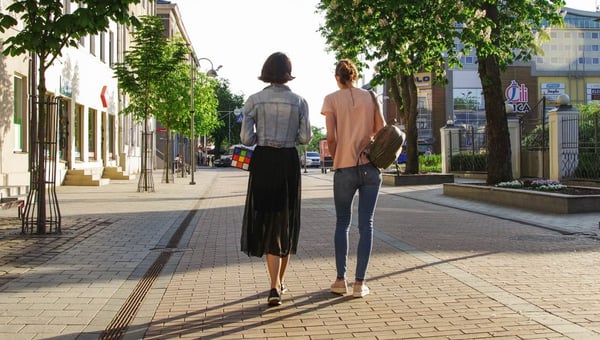
As 2019 draws closer, it’s time to think about how VR can transform your business. With numerous industries already embracing this advanced piece of tech, we are thoroughly excited to see what VR in 2019 will bring. It’s time to get on the bandwagon and let VR improve your business.
Here at Yulio, we strive for excellence in performance and integrity when it comes to our product, and customer service. To learn more about how VR can enhance your business workflow, sign up for our FREE 5-day email course. To try our program for yourself, sign up for our free 30-day trial (no strings attached).


.jpg?width=245&height=150&name=active-adult-beautiful-1799244%20(1).jpg)
